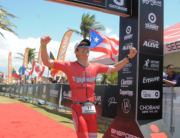
THE SWIM. When talking to a triathlete, if they voice a concern over their upcoming race, it is often THE SWIM. Cycling and running are fairly straightforward, require far less technique and despite the obvious factors of wind/weather, tend to throw fewer curve balls your way. But the swim will intimidate those who did not grow up in the water, those who learned to swim as an adult, and even those who are strong and competent swimmers, may at times get thrown off by rough conditions (cold water, strong waves or unpredictable currents). The best thing you can do to overcome these fears is to face them. Practice in the open water when the opportunity presents (which, to those who do not live in year-round warm climates, is infrequent at best). Race more often, even if they are small races; give yourself more opportunities to become more comfortable in the open water. Educate yourself on what to expect in the open water. As with anything in life, the best way to improve a weakness is to work on it.
With triathlon season rapidly approaching, I wanted to toss out some tips and tricks to help with the open water portion of racing. This list is far from comprehensive but some of those I feel can benefit us all. They come from years of practice, both personally and vicariously through coaching athletes; and of course, a few mistakes along the way. Remember, even strong “pool swimmers” have to constantly work and stay strong and focused to consistently execute successful open water swims.
- Athletic maturity in controlling the start. In short, do not go out too hard. You are likely already feeling excited and anxious. There is no need to exacerbate this with a hard 100-200 meters out of the gate, only to spike your heart rate and leave you feeling exhausted. If you can warm-up a few minutes prior, do so. When the gun or horn sounds, ease into your stroke. Stay relaxed. The crowd will thin, and you’ll find your rhythm. Let it come to you, do not force it.
- Embrace the conditions, do not fight them. You’re standing on the dock and suddenly the winds pick up. Within a few minutes, what started as fairly calm waters now have small white caps. It happens. Try your best to embrace the conditions thrown at you rather than get angry and fight them. A triathlon occurs outside, in unpredictable conditions; you have known this all along. This is part of the fun, part of the challenge! When winds shift or chop picks up, maintain control, adjust your stroke or breathing as needed, and keep on moving forward.
- Adjust & Adapt. To further the above point, simply adjust and adapt. And while this may be your stroke, it may also be your attitude. It is easy to turn negative or get frustrated with yourself. Make it a point to, when you find your thoughts turn negative, acknowledge them; let them go; and proceed forward. It is an amazing phenomenon but what the mind says, the body follows.
- Swimming is Swimming. Trust your ability. You may feel fatigue in your shoulders, or self-doubt creep in when you look up to sight and see an endless line of buoys. Instead of letting yourself get overwhelmed, remember it is one stroke after another. Consistently. Just like you have done in your training. While the venue is different, the process, at the root, remains the same. Remain calm and confident in your preparations. Ultimately, just keep swimming.
- Find a mantra. I don’t like to force these, but, if there is something you can come back to; a short saying, a few sentences; that help to keep you centered, relaxed and strong, find it and use it. It may be “Strong, smooth, steady” or “It’s not supposed to be easy” or “Bigger the challenge, the greater the reward.” Nothing is right or wrong here. This is personal and is only meant to help motivate and ‘inspire’ you, so to speak. But it can help when things get tough. Find it, and use it.
- Relax & Reset. In an open water swim, at the start of a very long day of exercising, I find this to be incredibly important. Things WILL happen you do not expect. Your body feels off. You get kicked by a fellow swimmer. Your goggles fill with water or worse, slip off your head. You find yourself off course. The decision you make now will dictate your day. Don’t have any regrets; rather than lose control, stop – take a breath – and reset. Focus on the journey that is the day and experience ahead of you, without letting one hiccup or bad decision be the end of your race.
- Look around you. –>This. Before you start your race, look around you at all the other people. All kinds of people. The volunteers. The support staff on kayaks. Family and friends cheering from the sidelines. Both newbies and experienced triathlon veterans racing alongside you. The process is the same, for everyone, even though your goals and reasons for being here are unique. You will all swim, bike and run. You will all have ups and downs throughout your day. When you feel apprehension, realize that you are not alone on this journey, you’re surrounded by the many fellow athletes you may not know, but ultimately, you’re all in this thing together.

Learn more about Kelly HERE.



